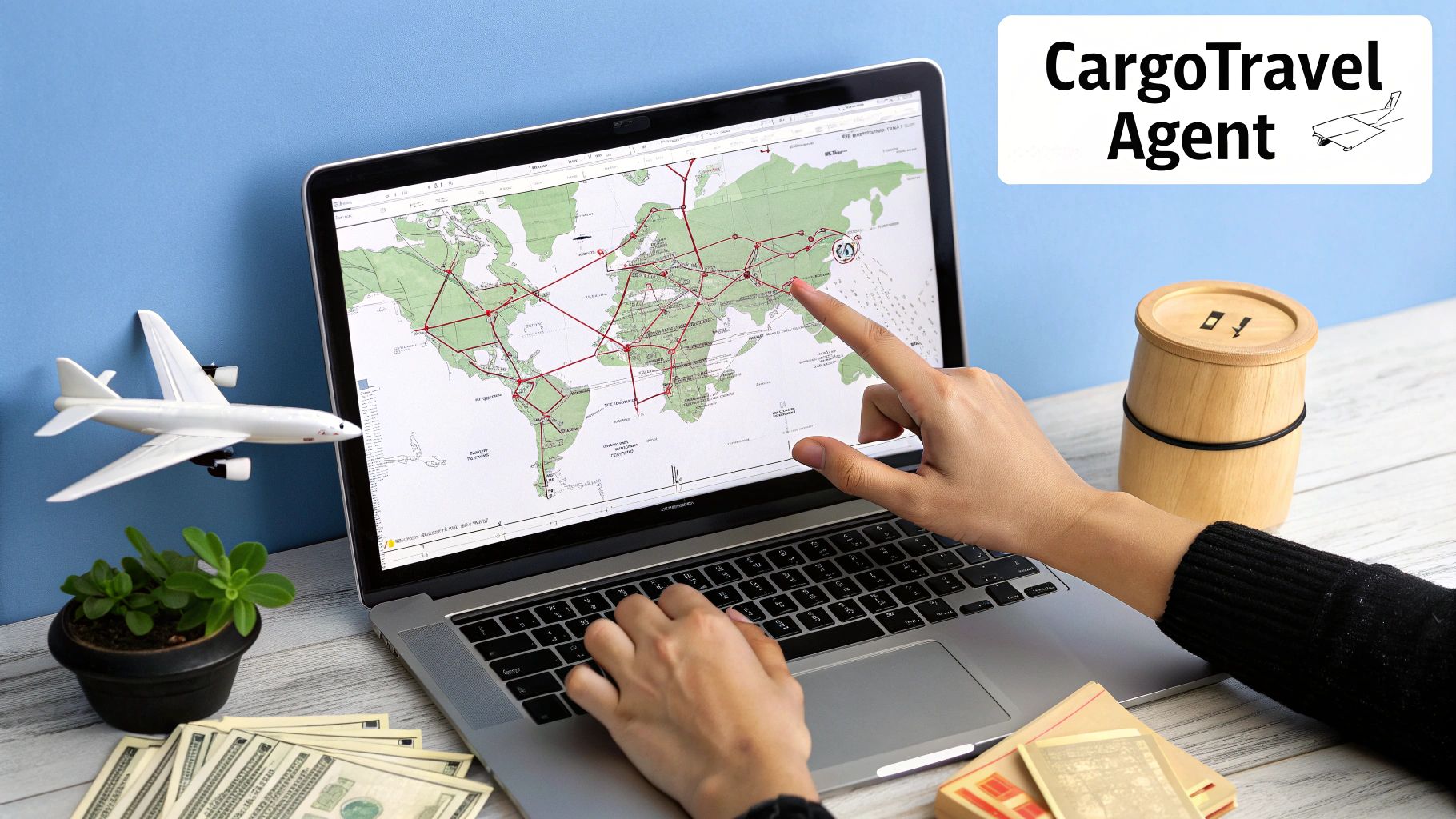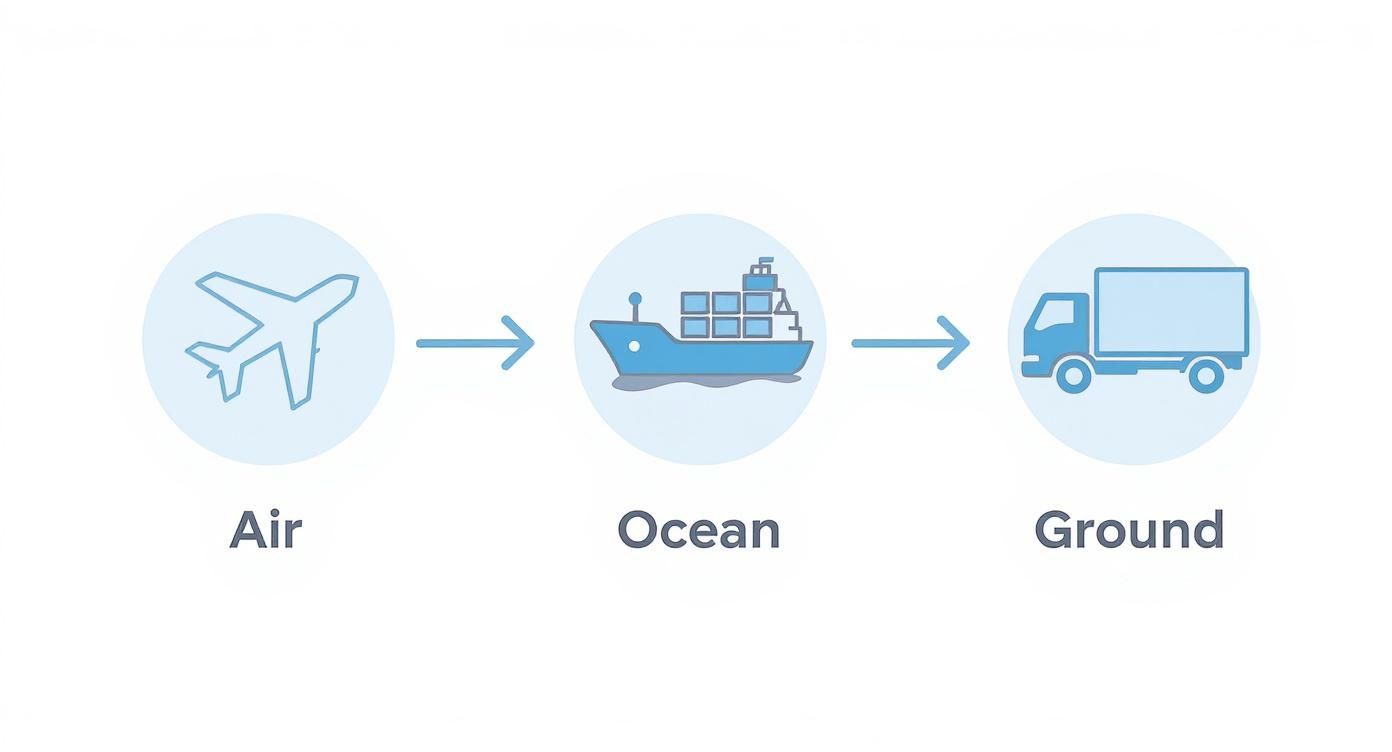Think of a freight forwarding service as the master coordinator for your international shipments. They aren't the ones actually flying the planes or sailing the ships; instead, they are the expert planners who orchestrate the entire complex journey from the factory to your customer's doorstep.
What Exactly Are Freight Forwarding Services?

A freight forwarder acts as the crucial link between your business (the shipper) and the massive, often confusing web of transportation services needed to move goods globally. They leverage their established relationships and deep industry knowledge to find and manage the best possible transport solutions for you. This goes way beyond just booking a spot on a container ship.
These services are absolutely vital for businesses trying to get a handle on managing supply chain disruptions and navigating the tricky waters of global logistics. They become your single point of contact, turning a potentially chaotic process into a manageable one.
The Core Role of a Forwarder
At its heart, a freight forwarder's job is to get your cargo from Point A to Point B on time, on budget, and in full compliance with all international laws. They accomplish this by taking a whole list of complex tasks off your plate.
Here’s a glimpse of what they handle:
- Carrier Negotiation and Booking: They find the best rates and secure space with air, sea, rail, or road carriers on your behalf.
- Documentation Management: They expertly prepare and process all the critical paperwork, from the Bill of Lading to customs declarations.
- Shipment Consolidation: For smaller shipments, they can group yours with others into a single container (LCL, or Less than Container Load), which dramatically cuts costs.
- Customs Clearance: They act as your customs agent, making sure all duties and taxes are handled correctly to avoid costly delays at the border.
Basically, they lift the entire logistical weight off your shoulders. This frees you up to focus on running your business, not getting bogged down in the minutiae of international shipping.
Why They Are Indispensable for Importers
If you’re importing goods—especially from a manufacturing powerhouse like China—a great freight forwarder isn't just a nice-to-have; it's essential. Their experience helps you sidestep common pitfalls like improper paperwork that can leave your goods stuck at port for weeks, or choosing a shipping method that blows your budget.
A skilled freight forwarder transforms the daunting task of international shipping into a predictable, manageable, and strategic part of your supply chain. Their value lies in their ability to anticipate problems, optimise routes, and provide a seamless door-to-door experience.
At Upfreights, for instance, our 98.5% on-time rate comes from precisely this kind of detailed management. The shipping world is full of jargon, so if you're new to this, check out our guide to common freight forwarding terminology to get up to speed.
Comparing Major Freight Service Options
Picking the right way to move your goods is a massive decision. It's the kind of choice that directly hits your bottom line, your delivery dates, and the overall health of your supply chain. This is where a good freight forwarder earns their keep—they're your guide to balancing the constant trade-off between speed, cost, and reliability. At the end of the day, most of the time, the big choice comes down to two options: air or sea.
Each one has a very different job to do. Think of air freight as the express courier of global trade, called upon when time is a luxury you don't have. Ocean freight, on the other hand, is the dependable workhorse, built to move incredible volumes of goods across the globe without breaking the bank. Getting a feel for their unique strengths is the first step to building a logistics plan that actually works.
Air Freight: When Speed Is Everything
When a shipment is urgent, high-value, or extremely time-sensitive, air freight is the only real conversation. Got a batch of newly-released electronics that need to hit store shelves for a launch event? Or critical machine parts needed to prevent a factory from shutting down? This is where you send it by air. Yes, it costs more, but the real value is in its sheer speed.
With a service like Upfreights, a shipment can get from a factory in China to a warehouse in the United Kingdom in as little as 1–7 days, door-to-door. That kind of velocity slashes the time your cash is tied up in inventory and lets you react to what the market wants, right now. For a closer look at how it all works, check out our detailed guide on using a freight forwarder for air freight.
Air freight is all about precision, not bulk. Its key advantages are pretty clear:
- Rapid Transit: Nothing moves goods between continents faster.
- Enhanced Security: Airports are locked down tight, which means a much lower risk of theft or damage.
- Reliable Schedules: Flights run like clockwork, giving you far more predictable arrival times.
Ocean Freight: For Cost-Effective Volume
When your main concern is cost and you have some wiggle room in your schedule, ocean freight is the clear winner. It’s the engine of global commerce, moving the overwhelming majority of everything we buy—from consumer goods and raw materials to heavy machinery.
It’s definitely the slower route. A container travelling from China to the US by sea can take anywhere from 15–35 days. But the trade-off is a cost-per-kilogram that air freight can't even come close to touching. This makes it the only practical choice for large, heavy, or bulky cargo that would be financially impossible to fly.
For any business dealing with large production runs or stocking up inventory well ahead of time, ocean freight delivers an unbeatable mix of massive capacity and low cost. The trick is simply to plan for the longer journey.
Now, even within ocean freight, you have a couple of key choices depending on how much stuff you’re actually shipping.
FCL vs LCL: Unpacking Your Container Options
The choice between Full Container Load (FCL) and Less than Container Load (LCL) boils down to one simple thing: the size of your shipment.
- Full Container Load (FCL): This is where you book an entire container (usually a 20ft or 40ft box) just for your goods. It's the best option for larger shipments that will fill most or all of a container. FCL is usually a bit faster than LCL because your container is sealed at the factory and isn't opened again until it reaches you. It’s also more secure since your products aren't being handled alongside anyone else's.
- Less than Container Load (LCL): Don't have enough to fill a whole container? No problem. LCL is designed for exactly this scenario. Your freight forwarder will group your shipment with cargo from other shippers inside a shared container. The big benefit is that you only pay for the space you actually use, which is a game-changer for smaller businesses and startups. The compromise? Transit times can be a little longer because of the extra work of consolidating and then de-consolidating the cargo at each port.
Choosing between air and ocean freight is a foundational decision in logistics. To make it clearer, here’s a straightforward comparison.
Comparing Air Freight vs Ocean Freight
This table breaks down the key differences to help you see which mode of transport aligns best with your cargo's specific needs.
| Feature | Air Freight | Ocean Freight |
|---|---|---|
| Speed | Very Fast (1-7 days) | Slow (15-35+ days) |
| Cost | High | Low |
| Capacity | Limited by aircraft size and weight | Huge capacity for large, heavy, and bulk goods |
| Security | High (strict airport regulations) | Good, but more touchpoints can increase risk |
| Reliability | Very reliable schedules, less weather impact | Can be affected by weather and port congestion |
| Best For | Urgent, high-value, perishable items | Bulk goods, non-urgent, cost-sensitive items |
Ultimately, the "best" option isn't universal; it's about what’s best for this specific shipment. Balancing these factors is key to an efficient and cost-effective supply chain.
Specialised Freight Forwarding Services
Beyond the standard air and sea routes, forwarders also handle shipments that need special care. Take temperature-controlled freight, for example. This involves using refrigerated containers, often called "reefers," to move things like pharmaceuticals, chemicals, or fresh food, making sure the product stays in perfect condition from origin to destination.
Of course, road and rail freight are the unsung heroes of the journey, especially for the first and last mile. In a country as vast as China, trucks are the lifeblood of logistics. Road transport makes up a staggering 38.16% of the country's total freight market revenue, acting as the critical link between factories, ports, and airports. This is a great example of how a true door-to-door service is actually a carefully choreographed dance between several different modes of transport.
How Forwarders Handle Customs and Paperwork
International shipping isn't just about getting a box from point A to point B. It’s about navigating a dense, often confusing web of international regulations. Honestly, customs clearance is where most of the headaches happen. A single mistake on one form can leave your valuable cargo sitting at a port for weeks, racking up unbelievable storage fees.
This is exactly where a seasoned freight forwarding service becomes indispensable. Think of them less as a shipping agent and more as your expert guide through the entire regulatory maze. They know the rules, they know the people, and they know how to get your shipment cleared without a fuss.
The Essential Document Checklist
Getting through customs smoothly all comes down to the paperwork. You need a specific set of documents that tells customs officials everything they need to know about your shipment. While the exact requirements can shift depending on the country, there are a few non-negotiables.
Your forwarder is responsible for gathering, checking, and managing these key documents:
- Commercial Invoice: This is the big one. It’s the primary document used to determine the value of your goods, which in turn is used to calculate the duties and taxes you'll owe. It lists the buyer, seller, product details, and the total value.
- Bill of Lading (B/L) or Air Waybill (AWB): This is your contract with the carrier (the airline or shipping line). It’s also proof they've received your goods. For ocean freight, the B/L can also act as the title to the goods – whoever holds the original, owns the cargo.
- Packing List: This document details exactly what’s inside every carton, pallet, or container, right down to the weight and dimensions of each piece. It's what customs officials use to verify the contents without having to tear everything open.
- Certificate of Origin (CO): This simply certifies which country the goods were made in. It’s critical for things like trade agreements, which can sometimes mean you pay much lower (or even zero) tariffs.
Getting these documents perfectly aligned is absolutely critical. Even a small discrepancy between the commercial invoice and the packing list is a huge red flag for customs, practically guaranteeing an inspection and a delay.
The journey below shows that no matter how your goods travel, customs is a checkpoint they all must pass.

Whether by air, sea, or land, every international shipment has to get the green light from customs before it can continue to its final destination.
The Customs Clearance Process Step-by-Step
A good freight forwarder takes the mystery out of the customs process by managing every stage methodically. They're on the lookout for potential problems, preventing the kinds of mistakes that lead to fines, seizures, or those dreaded storage charges.
Here’s a breakdown of what that process looks like in their hands:
- Pre-Arrival Declaration: Long before your shipment even docks at the port or lands at the airport, your forwarder is already at work. They submit all the required documents electronically to the customs authority to get a head start.
- Duties and Tax Calculation: Using the correct classification for your goods (known as an HS Code), the forwarder calculates the exact amount of import duties, tariffs, and taxes (like VAT) you owe.
- Payment and Release: They handle the payment of all these charges on your behalf. Once customs confirms they have the money and all the paperwork checks out, they issue a release for the cargo.
- Inspection Management: If your shipment gets flagged for a random or targeted physical inspection, your forwarder steps in. They coordinate with customs to make sure it happens as quickly as possible to keep delays to a minimum.
By taking ownership of every detail, a freight forwarder ensures your goods flow across borders without getting stuck. Their expertise is your best defence against the complexity of international trade law.
This seamless management is a huge part of what makes a logistics partner so valuable. To get a better sense of the nitty-gritty, you can learn more about how expert customs clearance services protect your business and keep your supply chain in motion.
Getting a Grip on Freight Costs and Timelines
Figuring out what you're actually paying for is the first step to getting your logistics budget under control. A freight quote can look like a cryptic list of codes and surcharges, but every single line item is there for a reason—it’s a specific service needed to get your shipment across the world. Once you demystify these costs, you can start making smarter, more cost-effective shipping decisions.
The final price of any shipment is never just about how far it’s travelling. It’s a carefully calculated total that’s pulled in different directions by a whole bunch of variables. Your freight forwarding services partner pieces together a quote from a mix of fixed and variable costs, and each one has a role to play in the final number you see.
Breaking Down What’s in a Freight Quote
At a high level, all the charges for your shipment can be bundled into a few key categories. Getting to know these helps you see exactly where your money is going and explains why prices can swing so wildly between different shipments and providers.
Here’s a look at what typically makes up your total cost:
- Base Carrier Rate: This is the core cost from the airline or shipping line to physically move your goods from Port A to Port B.
- Fuel Surcharges (BAF/FAF): Think of this as the carrier's way of dealing with unpredictable fuel prices. These fees can change often, which directly nudges your total quote up or down.
- Security Fees: These cover the mandatory security screenings at ports and airports, making sure everything is compliant with international safety rules.
- Terminal Handling Charges (THC): These are the fees charged by port authorities on both ends of the journey for all the lifting and shifting of your container around the terminal.
- Customs Duties and Taxes: These are collected by the government of the country you're shipping to. The amount is based on what your goods are (their HS Code) and how much they’re worth.
- Forwarder's Service Fee: This is what you pay your forwarder for their expertise—for managing all the paperwork, coordinating with everyone involved, and keeping you in the loop.
That's not everything, but it covers the main things that drive your shipping expenses. A good, transparent forwarder will always give you a detailed breakdown so you can see exactly what you’re paying for.
The Classic Trade-Off: Speed vs. Price
This is probably the biggest decision you'll have to make: do you need the speed of air freight or the savings of ocean freight? It's the ultimate logistics balancing act—time versus money. Air freight will set you back a lot more, but it can get your products delivered in just a few days. On the other hand, ocean freight is much, much cheaper, but you have to be prepared for transit times measured in weeks, not days.
For example, a typical air shipment with Upfreights can get from China to the UK in a lightning-fast 1–7 days. An ocean shipment on the same route? You’re looking at 25–35 days. The cost difference is a direct reflection of that urgency. You’re essentially paying a premium for speed, which means less time with your cash tied up in inventory and the agility to respond to market changes in a flash.
At its heart, a smart logistics strategy is about knowing when to pay more for speed and when to save money by planning for a longer journey. The right answer is different for everyone and depends on your product's value, what your customers expect, and how you manage your stock.
The market itself also has a huge say, especially with ocean freight. Rates are anything but static; they fluctuate with global demand, how much space carriers have, and even trade policies. For instance, ocean freight rates from China have been on a bit of a rollercoaster. In one recent month, the rate from Shanghai to the U.S. West Coast was $2,103 per FEU (Forty-foot Equivalent Unit), while the rate to the U.S. East Coast was $3,251 per FEU—a clear sign of different demand and capacity pressures on each route. You can dive deeper into these market shifts in this China market freight update. This is exactly why it’s so important to work with a forwarder who has their finger on the pulse of current pricing.
How Your Shipment’s Details Shape the Final Bill
Beyond just the mode of transport, the unique characteristics of your cargo directly influence the final price. A forwarder needs to factor in all these little details when they put together your quote.
- Weight and Volume: With air freight, the cost is based on volumetric weight (sometimes called dimensional weight). The airline will charge you for whichever is higher: the actual weight of the box or its volumetric weight. This system stops people from gaming the system by shipping huge, feather-light boxes that hog space but weigh next to nothing.
- Cargo Type: If you're shipping anything specialised, like hazardous materials or products that need to stay at a specific temperature, expect extra costs. This kind of cargo requires special handling, documentation, and equipment, and that all comes at a price.
- Consolidation Strategy: For smaller shipments, using LCL (Less than Container Load) ocean freight is a game-changer for saving money. Your forwarder groups your goods with cargo from other shippers into one shared container. This way, you only pay for the space you use instead of an entire container you don't need. It’s a perfect example of how freight forwarding services provide real value and open up global trade for smaller businesses.
How to Choose the Right Freight Forwarding Partner

Picking a freight forwarder is one of the most critical decisions you'll make for your supply chain. This isn't just about finding the cheapest quote. Think of it as hiring an extension of your own team—a logistics pro who will guard your interests, spot trouble before it starts, and genuinely improve how you do business.
The right partner can make your operations sing, ensuring your goods glide smoothly across borders. The wrong one? They can trap you in a nightmare of costly delays, damaged products, and steep regulatory fines. The goal is to find a provider who truly gets your business and can scale with you as you grow.
Evaluate Their Specialised Expertise
Here’s the thing: not all forwarders are the same. Many carve out a niche, becoming experts in certain industries, cargo types, or shipping routes. This specialised knowledge is gold and should be a huge factor in your choice. A forwarder who handles electronics day-in and day-out will instinctively know the right security protocols, while one focused on produce will be a master of temperature-controlled shipping.
So, start there. Ask about their experience with your specific products. Do you ship hazardous materials, oversized equipment, or fragile perishables? Ask to see case studies or talk to other businesses they work with who ship similar things. When a forwarder already knows the unique challenges of your industry, they’re prepared for problems before they even happen.
Just as important is their know-how in your key trade lanes. A forwarder with a strong local presence and solid relationships at both origin and destination is a game-changer. This is especially true if you're sourcing from a manufacturing powerhouse. For example, China's freight forwarding market is expected to hit an astonishing USD 1.31 trillion by 2030. A partner like Upfreights, with deep roots in that market, gives you a massive leg up when dealing with local customs and carrier networks.
Assess Their Network and Technological Capabilities
A forwarder’s real power comes from their global network. This web of offices, partner agents, carriers, and customs brokers is their secret sauce. A strong network means they have people on the ground at every step, ready to manage your shipment and provide a true door-to-door service with no gaps.
Technology is the other side of that coin. In today's world, you need to know where your stuff is. Your partner must have a modern, easy-to-use platform that gives you real-time tracking and updates. Being able to see your shipment's location at any moment puts you in control and helps you keep your own customers in the loop.
A forwarder’s investment in technology says a lot about their commitment to service and transparency. Platforms offering instant quotes, digital documents, and 24/7 visibility aren’t a luxury anymore—they’re essential.
Questions to Ask a Potential Freight Forwarder
Once you've got a shortlist, it's time to ask the tough questions. The answers will tell you everything you need to know about their competence, their customer service, and whether you can truly rely on them.
Here are a few essential questions to get the conversation started:
- Experience: "Can you show me some examples of how you've handled shipments for companies like mine?"
- Network: "How strong is your network in our main shipping countries? Are those your own offices or partner agents?"
- Communication: "Who will be my go-to person? How will you keep me updated, especially if there's a delay?"
- Insurance: "What kind of cargo insurance do you provide? What exactly does it cover, and what’s the claims process like?"
- Technology: "Can I see your tracking platform? How easy is it to get documents and manage my shipments online?"
- Compliance: "How do you keep up with all the customs rule changes in the countries we ship to?"
When you're looking into freight forwarding services, particularly for an e-commerce business like Amazon FBA, it's also smart to compare top FBA service providers. Many of these providers bundle logistics with their other services, giving you a better idea of who really understands the FBA ecosystem. This extra research will help you find a partner who doesn't just move boxes, but who also gets the specific demands of your sales channels.
Answering Your Freight Forwarding Questions
Even with a good grasp of the basics, it's completely normal to have more questions when you're getting started with freight forwarding. Global logistics has its own language and a lot of moving parts, which can feel a bit daunting at first.
To make things clearer, let's tackle some of the most common questions we get from clients day in and day out. Getting these sorted will give you the confidence you need to handle your international shipments like a pro.
What's the Difference Between a Freight Forwarder and a Carrier?
This is probably the number one point of confusion, but the distinction is actually quite simple. The easiest way to think about it is like planning a big holiday.
A carrier is the actual airline that owns the plane (like British Airways) or the shipping line that owns the container ship (like Maersk). They are the ones with the physical assets—the planes and vessels—that move your cargo from Point A to Point B.
A freight forwarder, like us here at Upfreights, is your expert travel agent for cargo. We don't own the planes or ships ourselves. Instead, we have established relationships and negotiated contracts with all the different carriers. Our job is to find the best route for your shipment, manage all the "tickets" (the documentation), and coordinate the entire journey from start to finish.
In a nutshell, the carrier does the heavy lifting, while the forwarder masterminds the entire logistics puzzle.
Are My Goods Automatically Insured During Shipment?
This is a critical one, and getting it wrong can be a very expensive mistake. The short answer is a firm no—your goods are not automatically insured for their full value.
Carriers do have a basic level of liability, but it's incredibly limited. It's usually calculated based on the weight of the cargo, not what it's actually worth. For instance, under international air transport rules, liability might be capped at around £19 per kilogram. If you're shipping lightweight, high-value electronics, that level of cover is nowhere near enough to protect you if the shipment is lost or damaged.
Always get dedicated cargo insurance through your freight forwarder. It’s a small extra cost that provides comprehensive, "all-risk" coverage, giving you proper protection against the unexpected.
Going without it is a huge financial gamble. A good forwarder will always offer cargo insurance as a standard part of their quote, and it's a safety net you really can't afford to skip.
Can a Freight Forwarder Handle Door-to-Door Delivery?
Yes, absolutely! This is one of the biggest benefits of working with a forwarder. A true door-to-door service is the ultimate hands-off solution for managing your supply chain.
When you opt for this, your forwarder handles every single leg of the journey. This includes:
- Collecting the goods directly from your supplier’s factory in China.
- Managing all the export paperwork and customs formalities.
- Booking and overseeing the main international freight leg, whether by air or sea.
- Clearing the shipment through import customs on arrival in the destination country.
- Arranging the final "last mile" delivery to your warehouse, office, or an Amazon FBA centre.
This complete, end-to-end management means you have one point of contact and one simple invoice for the entire process. It takes all the logistical headaches off your plate so you can focus on running your business.
Who Is Responsible if My Shipment Gets Delayed?
Figuring out who's at fault for a delay can be tricky because so many things can go wrong in transit. This is where a great freight forwarder really proves their worth—not just by preventing problems, but by managing them effectively when they happen.
Delays pop up for all sorts of reasons:
- Carrier Problems: A flight gets cancelled due to a technical issue, or a ship has to skip a port because of congestion.
- Customs Hold-ups: Your container gets pulled for a random inspection, or there's a tiny error in the paperwork that needs fixing.
- Acts of God: A typhoon in the South China Sea can throw sailing schedules into chaos for days.
While a forwarder can't control the weather or tell customs officials what to do, their responsibility is to be your problem-solver. That means communicating with you proactively, finding solutions (like getting your cargo on the next available flight), and working to resolve any issues as quickly as possible to minimise the disruption to your business.

